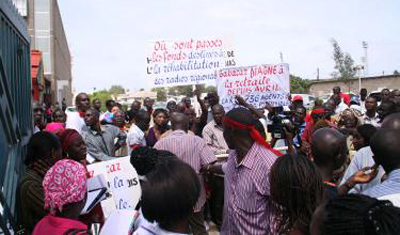The Senegalese state-controlled radio and TV Corporation, Radio Télévision Sénégalaise (RTS), is experiencing an internal struggle for editorial freedom as Senegal moves toward a presidential election on February 26, 2012.
RTS journalists and other employees are not only calling for the resignation of their managing director, Babacar Diagne, on accusations of mismanagement but demanding change in the station’s editorial line. On July 20, the local media trade union, SYNPICS, held a sit-in at the gates of RTS studios to protest the station’s editorial line, which, they said, is “too dedicated to the electioneering propaganda of PDS,” the ruling party of President Abdoulaye Wade. Wade is facing–for the first time after 10 years in power–strong protests linked to incessant power cuts, and his firm commitment to stand for a third term.
It is rare to witness such a public expression of discontent in the country’s state-owned media, known for its docility. The anger of RTS staffers has been directed at Diagne, who has maintained a policy of systematic propaganda while at the helm of RTS since the regime of President Abdou Diouf, who lost to Wade in the 2000 election. Compounding the anger of RTS journalists was the fact that Diagne received an extension of his employment contract despite reaching having hit retirement age.
In an interview with CPJ from his office in the capital, Dakar, Diagne sidestepped accusations of political propaganda, referring queries to the state-run National Broadcasting Regulation Council (CNRA). “RTS now broadcasts five political programs,” he said, adding that there had been none before he took office.
This “rebellion” of workers at RTS–which the private press in Dakar calls “Rien Tous les Soirs” (Nothing Every Evening)–is a clear indicator of the tensions between Wade and the Senegalese media. Tensions have been heightened since June 23, when the Dakar and several cities were in the grip of riots following Wade’s failed attempt to amend the constitution to reduce the proportion of votes needed to win a presidential election. A week later, the president blamed the violence on the fact that “the Senegalese media are nests for opponents who will not come to terms with themselves!”
